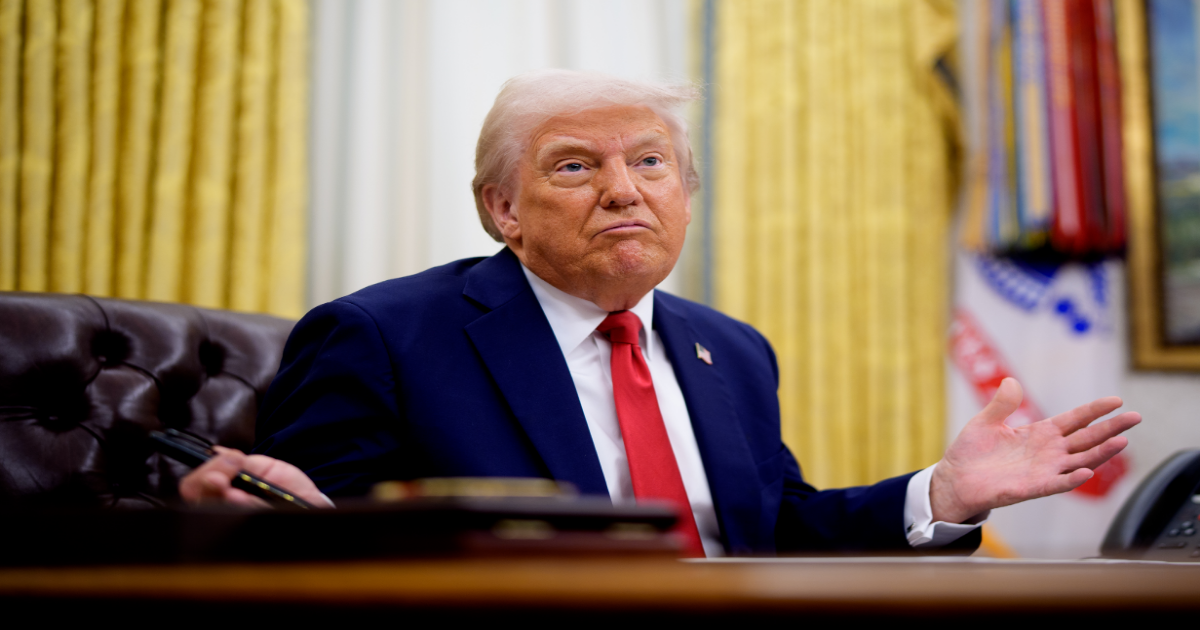As his global trade war spun further worldwide chaos on Wednesday, with China and the European Union hitting back and the financial fallout spreading to bond markets, President Donald Trump showed no signs of pulling back.
On the contrary, he urged anyone increasingly worried about rising recession fears as his tariffs officially took effect, to relax.
“BE COOL,” he wrote in a social media post. “Everything is going to work out well. The USA will be bigger and better than ever before!”
He followed up in a second post with a line of financial advice, signed with his initials: “THIS IS A GREAT TIME TO BUY!!! DJT”
Neither Trump’s nonchalance nor his aides’ spaghetti-at-the-wall — and often contradictory — reassurances and rationales have calmed the markets. If anything, the White House’s public responses from aides defending the president’s trade war on Sunday talk shows combined with his own defiance are adding to the uncertainty that has caused trading indexes to spiral out of control and other countries to respond in kind.
After the White House expanded tariffs on all Chinese goods to a remarkable 104 percent, Beijing responded on Wednesday with additional tariffs on imports from the United States for a total of 84 percent.
Around the same time, EU member states voted to approve counter-tariffs against the U.S. that would take effect Tuesday, the bloc’s first response to Trump’s tariffs on steel and aluminum from Europe. The retaliatory tariffs will affect nearly €21 billion of U.S. products — everything from soybeans to motorcycles and orange juice — and take effect in three waves.
The EU has yet to respond to Trump’s 20 percent “reciprocal” tariffs on all EU exports, which took effect on Wednesday, and his latest 25 percent tariff on cars. And a statement from Brussels made clear that European officials would prefer to find an off-ramp than continue to escalate, noting that the new tariffs can be suspended at any time.
“The EU considers U.S. tariffs unjustified and damaging, causing economic harm to both sides, as well as the global economy,” the EU said in the statement. “The EU has stated its clear preference to find negotiated outcomes with the U.S., which would be balanced and mutually beneficial.”
The expanding trade war continued to affect financial markets, triggering more losses on Wednesday. Trading on the S&P 500 continued to fluctuate with the index still near bear market territory, a 20 percent drop from a recent peak — a rare and concerning marker for investors.
Perhaps more concerning was the spread of the turmoil to government bond markets, thought to be a safe haven during periods of great volatility.
Yields on the 10-year Treasury note, which rise when prices fall as investors sell bonds, climbed to 4.37 percent on Wednesday, after rising earlier to 4.5 percent, the highest since February.
Industry CEOs and lobbyists have spent the last few days appealing to anyone who might have direct access to Trump, in an effort to get information in front of the president about the damage that an extended trade war would have on various parts of the economy. But few in Trump’s orbit can say what would prompt him to back down, or even what an endgame might look like.
One emerging theory is that Trump may look to declare victory if he can strike quick trade deals with allies already engaged in negotiations like Japan and South Korea, and eventually force the European Union to the table. But that’s only a theory.
“I’m not entirely confident of anything right now,” said one high-level executive, who was granted anonymity because of the sensitivity of the situation.
Staff writer Adam Cancryn contributed to this report.
